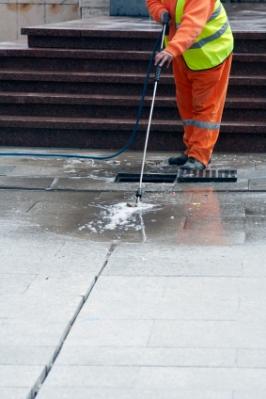
When it comes to cleaning greasy parts and heavy machinery, using an aqueous cleaning solution is the safest and best way to go. It is safer for your workers, safer for your shop as it presents no fire hazard and it's safer for the environment.
Degreasing Parts Using Mineral Spirits
It has been typical practice to use mineral spirits in a parts shop to best clean greasy and hard to clean parts like heavy cogs, wheels, and gears. However, mineral spirits present numerous issues, the least of which is that they are bad for the environment. While mineral spirits do clean well--they are an unnecessary hazard when you have the alternative of water based cleaning solutions.
Mineral Spirits Are a Fire Hazard
Mineral spirits are highly flammable. While garages take extra safety precautions to ensure that nothing is lit on fire, the fact remains that mineral spirits are flammable and do pose an unnecessary risk. Add to that that many people unsafely reuse and recycle their mineral spirits after cleaning and the hazard is just unnecessary.
Mineral Spirits Emit VOCs
VOCs are volatile organic compounds. If you've ever breathed in air that is full of paint thinner--you are inhaling VOCs. These substances contribute to smog and are a key pollutant in the environment. In addition, they pose health risks to the person who is breathing them in!
Special Clean Up Required
You cannot dump leftover cleaning solution made with mineral spirits into the public sewage system. Doing so is not only illegal, but it can cause corrosion and other issues in the sewer. Consequently, shops that use mineral spirits to clean heavy machinery have to pay someone to clean up properly. Aqueous cleaning solutions are generally much easier to clean up although doing so requires different waste management techniques.
What Are Aqueous Cleaning Solutions?
An aqueous cleaner is one that contains less than five percent VOCs and is 95% or more water. That doesn't mean that it doesn't contain chemicals, but simply that it contains chemicals that are not considered as harmful to the environment as those that are in mineral spirits. While solvents dissolve the grease, aqueous cleaners rely on agitation, soap, and other chemicals to break dirt into smaller pieces.
Myths About Using Aqueous Solutions
There is an environmental push to make sure that all heavy machinery shops use aqueous cleaners to clean equipment. However, there are still many myths surrounding the use of aqueous cleaners.
Myth: ACS Doesn't Clean as Well
Fact: ACS does clean just as well as solvents although it cleans differently. In particular, using an aqueous spray cabinet can clean as effectively and also manage "hard to reach" grooves in gears.
Myth: Aqueous Cleaners Are Expensive
Fact: Shops can save money by using aqueous cleaners. They do not require the substantial disposal costs of mineral solvents. Also, implementing aqueous spray cabinets can reduce the need for workers thus saving money both on labor and by lengthening the life of the aqueous solution.
Myth: Disposal of Aqueous Cleaners Is Difficult
Fact: Actually, you can recycle quite a bit from an aqueous cleaning cabinet. Solution with sludge typically only requires disposal a few times per year. Skimmed oil can be recycled with used oil. Likewise, filters can generally be disposed of along with used oil filters.
Manufacturers
There are several companies that specialize in selling clean air solvents (also referred to as aqueous cleaners). For more information, you can follow any of the links below.
- Gemtek, Contact
- IPAX, Contact
- Mirachem, Contact Info
- Magnaflux
- Zep, Contacts
- Diana Industries International
- CRC Industries, Contact
It is recommended that you find out about the laws in your city or state first regarding cleaning solutions.







